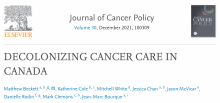In the summer of 2021, Max Bell School Master of Public Policy candidates Danielle Appavoo, Mariel Aramburu, Ricardo Chejfec, and Anil Wasif responded to a call to the academic community from Québec’s Minister of Finance, M. Eric Girard. The Minister was interested in proposals from universities and research groups, namely on (i) fiscal policy in Québec, (ii) the province’s economic potential and (iii) the fight against climate change.


The “5-SENSE” score can predict who will not benefit from stereo-electroencephalography
A new study from The Neuro (Montreal Neurological Institute-Hospital) and eight collaborating international epilepsy centers has developed a simple web-based application clinicians can use to predict which patients will not benefit from an invasive diagnostic work-up, preventing unnecessary, invasive procedures, saving time for patients and the clinical team, and freeing up overburdened health resources.

The impairments observed may explain poor decisions about COVID-prevention measures
The COVID-19 pandemic has tested our psychological limits. Some have been more affected than others by the stress of potential illness and the confusion of constantly changing health information and new restrictions. A new study finds the pandemic may have also impaired people’s cognitive abilities and altered risk perception, at a time when making the right health choices is critically important.

Federation represents 122 neurological societies around the world
The Neuro’s director, Dr. Guy Rouleau, has been elected first vice-president of the World Federation of Neurology. The first vice-president and other WFN officers are elected by delegates from its 122 neurological societies around the world.
The mission of the WFN is to foster quality neurology and brain health worldwide by promoting global neurological education and training with emphasis placed firmly on under-resourced parts of the world.

The Tanenbaum Open Science Institute (TOSI) at The Neuro welcomes the Hotchkiss Brain Institute as a new partner to transform brain research through Open Science

Highlights
- Cancer incidence and mortality in Indigenous peoples of Canada are increasing
- These populations face modifiable risk factors and lack of access to care
- Indigenous cancer care has been jurisdictionally complex and ambiguous
- Successful initiatives must be locally contextualized, with Indigenous leadership
Just testing the news content

International team seeks hidden signs of brain damage in REM behavior disorder
People with rapid eye movement (REM) sleep behavior disorder act out their dreams. While sleeping safely in bed, for example, they might throw up their arms to catch an imaginary ball, or try to run from an illusory assailant. Such actions are more than just a nuisance. People with the disorder have a 50 to 80 per cent chance of developing a serious neurodegenerative disease within a decade of diagnosis.

SUMMARY
The number of patients with cancer in Africa has been predicted to increase from 844 279 in 2012 to more than 1·5 million in 2030. However, many countries in Africa still lack access to radiotherapy as a part of comprehensive cancer care. The objective of this analysis is to present an updated overview of radiotherapy resources in Africa and to analyse the gaps and needs of the continent for 2030 in the context of the UN Sustainable Development Goals.

Samer Faraj, Professor of Strategy & Organization
“Losing Touch: An Embodiment Perspective on Coordination in Robotic Surgery”
Winner of the 2021 OCIS Best Published Paper Award
Organizational Communication & Information Systems - OCIS
(A Division of the Academy of Management - AOM)

Artificial neural networks modeled on real brains can perform cognitive tasks
A new study shows that artificial intelligence networks based on human brain connectivity can perform cognitive tasks efficiently.
SUMMARY

Tropical coral reefs are the most biodiverse underwater ecosystem, providing a home to more than a quarter of all marine species. No strangers to environmental stressors and the on-going impacts of climate change, the survival of corals has increasingly been under threat in recent years. A collective of researchers, including from McGill University, have analyzed how environmental factors influence the growth and health of corals and found that more species of corals are living in the mangrove forests than in nearby shallow reefs.

Visible minorities, health-care workers and young people in Quebec have been at higher risk of experiencing COVID-19-related discrimination and more likely to suffer from poor mental health in the past year, according to a collective of researchers from McGill University, Concordia University and the University of Ottawa.
The researchers set out to study how factors such as people’s socioeconomic and minority status, discrimination, stigmatization and mental health impact their understanding and adoption of public health measures to combat the coronavirus.

To make sense of complex environments, brain waves constantly adapt, compensating for drastically different sound and vision processing speeds
Every high-school physics student learns that sound and light travel at very different speeds. If the brain did not account for this difference, it would be much harder for us to tell where sounds came from, and how they are related to what we see.
